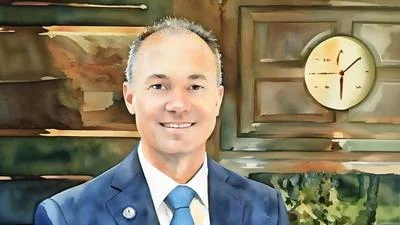As U.S. foreign policy is being realigned with many nations, the longstanding alliance between Israel and the United States also faces new tests.
Israeli historian and commentator Gadi Taub confronts the shifting strategic dynamics head-on, expressing growing unease within Israel over perceived U.S. ambivalence toward Iran and the broader region.
Taub, a defender of Israeli sovereignty and a critic of diplomatic compromises that risk the nation’s security, argues that American overtures to adversarial actors—especially Iran—signal a departure from the support Israel once relied on. His view is that the U.S.-Israel relationship should go forward not on sentiment, but on mutual interest and a new clarity of purpose.
Taub is a renowned Israeli historian, author, and journalist, and has long been a prominent voice on Israeli politics and U.S.-Israel relations. He is host of the influential Israel Update podcast and a frequent speaker at institutions like the Hudson Institute.
From Israel’s perspective—in his view—recent developments suggest uncertainty about the strength of U.S. support. “Israel feels that Trump may have just turned his back on us,” Taub says, citing deals with the Houthis that seemed to exclude protecting Israel, negotiations with Gulf Sunni states, and ongoing talks with Iran. “It began with the Houthis. He made a deal... which excluded shooting at Israel,” Taub notes, describing it as a troubling signal that the U.S. might be willing to sacrifice Israeli interests.
Iran looms large in Israeli strategic concerns. Taub points out that while American officials claim they will not allow uranium enrichment on Iranian soil, Israelis remain skeptical. “Iranians are very devious, very patient, and very bold in their negotiations,” he says. “They have no qualms about cheating.” When asked if Trump could secure a deal dismantling Iran’s nuclear capabilities, Taub recalls Netanyahu’s response: “Do you trust the Iranians?”
Taub acknowledges that American negotiations with Iran could embolden others, including Russia and Gulf states, to engage with Tehran. “If America is negotiating directly with Iran with its back to Israel, it gives a signal that it’s not as dangerous as before to approach Iran,” he says.
Speculation about a rift between Trump and Israeli Prime Minister Benjamin Netanyahu is difficult to confirm, according to Taub. “I don’t think that I can say it’s fake news,” he says, stressing the unpredictability of Trump’s political style.
However, he is unequivocal about what Israel must do next: “We need to move directly to occupy the whole of the Gaza Strip,” arguing that only full military control can dismantle Hamas and prevent external actors, like Saudi Arabia, from imposing a peace deal unfavorable to Israeli interests. “There cannot be another Nazi state on our border,” Taub says.
Trump’s advocacy for the Abraham Accords is recognized, but Taub is cautious about the price. “If the price is a Palestinian state, that is not a price worth paying for us,” he says, underscoring that Netanyahu’s life missions are preventing both a Palestinian state and an Iranian nuclear weapon. Even economic benefits or formal peace with Saudi Arabia would not outweigh the security risks for Israel.
From Taub’s viewpoint, any gains from Trump’s recent trip to the region hinge on a complete dismantling of Iran’s nuclear program. Still, he worries that the broader American strategy risks unraveling long-standing alliances. He contrasts the Trump administration’s prior support for Israel—moving the U.S. embassy to Jerusalem and pulling out of the Iran deal—with what he sees now as a confusing outreach to Iran.
Taub believes Netanyahu remains committed to ensuring Israel’s independence, particularly when it comes to defense. “Israel is not a vassal state,” he says. “It should respect the alliance [with the U.S.] but take care of its existential interests according to its own judgment.” He points out that Netanyahu has defied American administrations before, but doing so now is more complicated with a divided American political landscape.
Israel’s dependence on U.S. military aid is another concern. Netanyahu’s desire for Israel to become militarily independent is, according to Taub, a direct result of past pressures. “It’s not a good thing for an ally to be completely dependent on the other partner so that the other partner has a veto over our policy,” he says, advocating for diversified military partnerships, particularly with countries like India.
Taub also expresses concern over the rise of isolationist sentiment in the American right, spearheaded by figures like Tucker Carlson. “Israelis are very aware of it because isolationism very easily seeps into anti-Semitism,” he says, noting that blaming Israel for American entanglements abroad has dangerous historical echoes.
For Taub, Iran is not just a threat to Israel but to the entire world order. A nuclear Iran would ignite an arms race and empower extremist groups. “If you think that these crazies... would join the nuclear arms race and that would not influence America, then you’re dreaming,” he says. Beyond geopolitics, Taub sees Israel as a frontline state in a broader struggle between Western civilization and barbarism, a sentiment he believes is underappreciated by many in the West.
“Sooner or later other countries are going to wake up to this, and America had better wake up,” he says. He points to the rise of radical anti-Western ideologies within America itself, citing the spread of anti-Semitic sermons and growing enclaves governed by Sharia law in Europe as cautionary tales.
“We are the front line,” Taub says, “in the same war against the people who murdered journalists in Paris, against the people who murdered gay director Theo van Gogh in Amsterdam… Civilization must stand against barbarism.”









